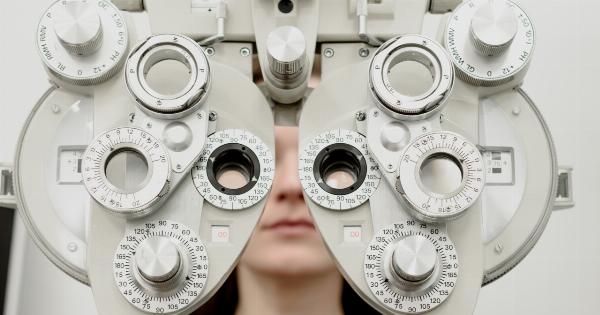Corneal transplantation, also known as corneal grafting, is a surgical procedure that involves replacing a damaged or diseased cornea with a healthy cornea from a donor.
The cornea is the clear, dome-shaped tissue at the front of the eye, and it plays a crucial role in focusing light onto the retina, allowing us to see clearly.
When is Corneal Transplantation Recommended?
Corneal transplantation is usually recommended when the cornea becomes damaged or diseased to the point where it affects vision and cannot be corrected with eyeglasses, contact lenses, or other non-surgical treatments.
Some common conditions that may require corneal transplantation include:.
- Corneal scars
- Keratoconus
- Fuchs’ dystrophy
- Corneal thinning
- Corneal ulcers
- Corneal edema
The Corneal Transplantation Procedure
The corneal transplantation procedure involves several steps and is typically performed as an outpatient procedure under local or general anesthesia.
The surgeon carefully removes the damaged or diseased cornea and replaces it with a healthy donor cornea. There are different types of corneal transplantation procedures, including:.
Penetrating Keratoplasty (PK)
Penetrating keratoplasty, also known as full-thickness corneal transplantation, involves replacing the entire thickness of the cornea. The surgeon removes a button-shaped disc of the damaged cornea and replaces it with a donor cornea of the same size.
Lamellar Keratoplasty
Lamellar keratoplasty is a partial-thickness corneal transplantation procedure. It involves replacing only the damaged layers of the cornea, leaving the healthy layers intact. This procedure is commonly used for conditions such as keratoconus.
Recovery and Resuming Daily Activities
After corneal transplantation surgery, it is important to follow the post-operative care instructions provided by your surgeon for a successful recovery.
The recovery period may vary from person to person, but most patients can resume their daily activities within a few days to weeks after the surgery.
Immediate Post-Operative Period
During the immediate post-operative period, your eye may be covered with a shield or patch to protect the newly transplanted cornea. Your surgeon will prescribe eye drops or medications to prevent infection and promote healing.
It is important to strictly follow the medication schedule and avoid rubbing or putting pressure on your eye.
Rest and Healing
During the initial days after the surgery, it is best to take ample rest and avoid strenuous activities.
Your surgeon may advise you to avoid activities that may strain the eyes, such as reading for long durations or using electronic devices excessively. It is also important to avoid swimming or exposing your eyes to water for at least a few weeks.
Gradually Resuming Activities
As your eye heals and your vision improves, you can gradually start resuming your daily activities. Your surgeon will inform you about the specific activities you can engage in at different stages of the recovery process.
It is essential to attend all follow-up appointments to monitor your progress and ensure proper healing.
Benefits and Success Rates of Corneal Transplantation
Corneal transplantation is a highly successful procedure that offers numerous benefits, including:.
- Improved vision
- Relief from pain or discomfort
- Enhanced appearance of the eye
- Improved quality of life
The success rates of corneal transplantation are generally high, with the majority of patients experiencing significant improvements in their vision.
According to the Eye Bank Association of America, the success rate for corneal transplantation is around 90%.
Conclusion
Corneal transplantation is a remarkable surgical procedure that can restore clear vision and improve the quality of life for individuals with damaged or diseased corneas.
With advancements in surgical techniques and post-operative care, the recovery period has significantly shortened, allowing patients to resume their daily activities at a faster pace. If you are experiencing vision problems due to corneal issues, consult with an ophthalmologist to determine if corneal transplantation is the right solution for you.































